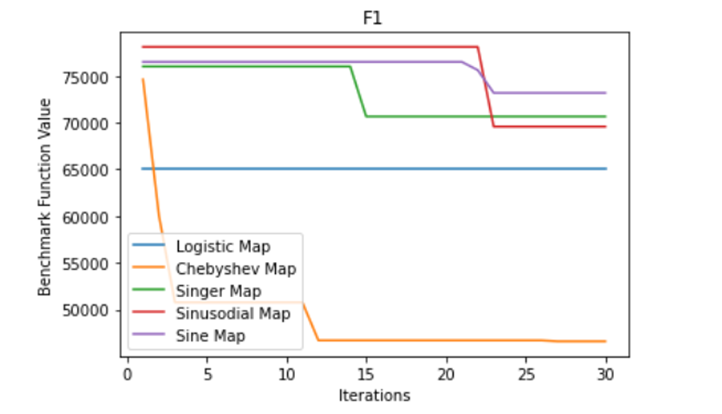An Improved Chaotic Grey Wolf Optimization Algorithm (CGWO)
Main Article Content
Abstract
Grey Wolf Optimization (GWO) is a new type of swarm-based technique for dealing with realistic engineering design constraints and unconstrained problems in the field of metaheuristic research. Swarm-based techniques are a type of population-based algorithm inspired by nature that can produce low-cost, quick, and dependable solutions to a wider variety of complications. It is the best choice when it can achieve faster convergence by avoiding local optima trapping. This work incorporates chaos theory with the standard GWO to improve the algorithm's performance due to the ergodicity of chaos. The proposed methodology is referred to as Chaos-GWO (CGWO). The CGWO improves the search space's exploration and exploitation abilities while avoiding local optima trapping. Using different benchmark functions, five distinct chaotic map functions are examined, and the best chaotic map is considered to have great mobility and ergodicity characteristics. The results demonstrated that the best performance comes from using the suitable chaotic map function, and that CGWO can clearly outperform standard GWO.
Article Details
References
Kennedy, J., 2006. Swarm intelligence. In Handbook of nature-inspired and innovative computing (pp. 187-219). Springer, Boston, MA.
Yegnanarayana, B., 2009. Artificial neural networks. PHI Learning Pvt. Ltd.
Fogel, D.B., 1998. Evolutionary computation: the fossil record. Wiley-IEEE Press.
Kennedy, J., 2006. Swarm intelligence. In Handbook of nature-inspired and innovative computing (pp. 187-219). Springer, Boston, MA.
Wolpert, D.H. and Macready, W.G., 1997. No free lunch theorems for optimization. IEEE transactions on evolutionary computation, 1(1), pp.67-82.
Alba, E., Dorronsoro, B.: The exploration/exploitation tradeoff in dynamic cellular genetic algorithms. IEEE Trans. Evol. Comput. 9(2), 126–142 (2005). https://doi.org/10.1109/TEVC.2005. 843751
Song, H., Triguero, I., Özcan, E.: A review on the self and dual interactions between machine learning and optimisation. Progress Artifcial Intell. 8(2), 143–165 (2019). https://doi.org/10.1007/ s13748-019-00185-z
Mirjalili, S., Lewis, A.: The Whale optimization algorithm. Adv. Eng. Softw. 95, 51–67 (2016). https://doi.org/10.1016/j.adven gsoft.2016.01.008
Lu C, Li XY, Gao L, Liao W, Yi J (2017) An effective multiobjective discrete virus optimization algorithm for flexible job shop scheduling problem with controllable processing times. Comput Indust Eng 104:156–174
Zhang J, Sanderson AC (2009) JADE: adaptive differential evolution with optional external archive. Evolut Comput IEEE Trans 13:945–958
Mirjalili, S., Mirjalili, S.M., Lewis, A.: Grey wolf optimizer. Adv. Eng. Softw. 69, 46–61 (2014). https://doi.org/10.1016/j.adven gsoft.2013.12.007
Kohli, M. and Arora, S., 2018. Chaotic grey wolf optimization algorithm for constrained optimization problems. Journal of computational design and engineering, 5(4), pp.458-472.
He, D., He, C., Jiang, L.-G., Zhu, H.-W., & Hu, G.-R. (2001). Chaotic characteristics of a one-dimensional iterative map with infinite collapses. IEEE Transactions on Circuits and Systems I: Fundamental Theory and Applications, 48(7), 900–906
Gandomi, A. H., & Yang, X.-S. (2014). Chaotic bat algorithm. Journal of Computational Science, 5(2), 224–232.
Kellert, S.H.: In the wake of chaos: Unpredictable order in dynamical systems. University of Chicago press, (1994)
Yang, D., Li, G., Cheng, G.: On the efficiency of chaos optimization algorithms for global optimization. Chaos, Solitons Fractals 34(4), 1366–1375 (2007). https://doi.org/10.1016/j.chaos.2006. 04.057.
Dewangan, P.D., Patnana, N., Barik, L., Krishna, P.J., Meena, V.P. and Singh, V.P., 2022, March. Performance Evaluation of GWO Algorithm Using Different Initialization Strategies. In 2022 8th International Conference on Advanced Computing and Communication Systems (ICACCS) (Vol. 1, pp. 714-718). IEEE.
Lu, C., Gao, L., Li, X., Hu, C., Yan, X. and Gong, W., 2020. Chaotic-based grey wolf optimizer for numerical and engineering optimization problems. Memetic Computing, 12(4), pp.371-398.
Mosavi, M.R., Khishe, M. and Ghamgosar, A., 2016. Classification of sonar data set using neural network trained by gray wolf optimization. Neural Network World, 26(4), p.393.
Escobar, H. and Cuevas, E., 2021. Implementation of Metaheuristics with Extreme Learning Machines. In Metaheuristics in Machine Learning: Theory and Applications (pp. 125-147). Springer, Cham.
Wang, G.G., Deb, S., Gandomi, A.H., Zhang, Z. and Alavi, A.H., 2014, September. A novel cuckoo search with chaos theory and elitism scheme. In 2014 International Conference on Soft Computing and Machine Intelligence (pp. 64-69). IEEE.
Asghari, K., Masdari, M., Gharehchopogh, F.S. and Saneifard, R., 2021. A chaotic and hybrid gray wolf-whale algorithm for solving
continuous optimization problems. Progress in Artificial Intelligence, 10(3), pp.349-374.
Yang, Z. and Wei, C., 2020. Prediction of equipment performance index based on improved chaotic lion swarm optimization–LSTM. Soft Computing, 24(13), pp.9441-9465.
Kohli, M. and Arora, S., 2018. Chaotic grey wolf optimization algorithm for constrained optimization problems. Journal of computational design and engineering, 5(4), pp.458-472.
Qin, X., Qiao, Y. and Hu, G., 2020. Degree reduction of SG?Bézier surfaces based on grey wolf optimizer. Mathematical Methods in the Applied Sciences, 43(10), pp.6416-6429.
Varol Altay, E. and Alatas, B., 2020. Bird swarm algorithms with chaotic mapping. Artificial Intelligence Review, 53(2), pp.1373-1414.

